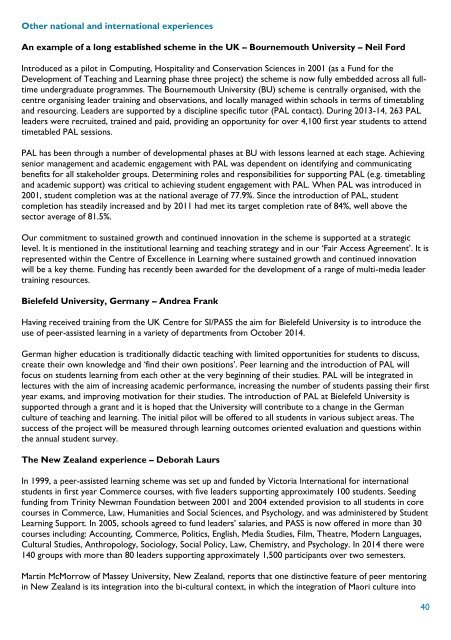Peer_led_learning_Keenan_Nov_14-final
Peer_led_learning_Keenan_Nov_14-final
Peer_led_learning_Keenan_Nov_14-final
You also want an ePaper? Increase the reach of your titles
YUMPU automatically turns print PDFs into web optimized ePapers that Google loves.
Other national and international experiencesAn example of a long established scheme in the UK – Bournemouth University – Neil FordIntroduced as a pilot in Computing, Hospitality and Conservation Sciences in 2001 (as a Fund for theDevelopment of Teaching and Learning phase three project) the scheme is now fully embedded across all fulltimeundergraduate programmes. The Bournemouth University (BU) scheme is centrally organised, with thecentre organising leader training and observations, and locally managed within schools in terms of timetablingand resourcing. Leaders are supported by a discipline specific tutor (PAL contact). During 2013-<strong>14</strong>, 263 PALleaders were recruited, trained and paid, providing an opportunity for over 4,100 first year students to attendtimetab<strong>led</strong> PAL sessions.PAL has been through a number of developmental phases at BU with lessons learned at each stage. Achievingsenior management and academic engagement with PAL was dependent on identifying and communicatingbenefits for all stakeholder groups. Determining roles and responsibilities for supporting PAL (e.g. timetablingand academic support) was critical to achieving student engagement with PAL. When PAL was introduced in2001, student completion was at the national average of 77.9%. Since the introduction of PAL, studentcompletion has steadily increased and by 2011 had met its target completion rate of 84%, well above thesector average of 81.5%.Our commitment to sustained growth and continued innovation in the scheme is supported at a strategiclevel. It is mentioned in the institutional <strong>learning</strong> and teaching strategy and in our ‘Fair Access Agreement’. It isrepresented within the Centre of Excellence in Learning where sustained growth and continued innovationwill be a key theme. Funding has recently been awarded for the development of a range of multi-media leadertraining resources.Bielefeld University, Germany – Andrea FrankHaving received training from the UK Centre for SI/PASS the aim for Bielefeld University is to introduce theuse of peer-assisted <strong>learning</strong> in a variety of departments from October 20<strong>14</strong>.German higher education is traditionally didactic teaching with limited opportunities for students to discuss,create their own know<strong>led</strong>ge and ‘find their own positions’. <strong>Peer</strong> <strong>learning</strong> and the introduction of PAL willfocus on students <strong>learning</strong> from each other at the very beginning of their studies. PAL will be integrated inlectures with the aim of increasing academic performance, increasing the number of students passing their firstyear exams, and improving motivation for their studies. The introduction of PAL at Bielefeld University issupported through a grant and it is hoped that the University will contribute to a change in the Germanculture of teaching and <strong>learning</strong>. The initial pilot will be offered to all students in various subject areas. Thesuccess of the project will be measured through <strong>learning</strong> outcomes oriented evaluation and questions withinthe annual student survey.The New Zealand experience – Deborah LaursIn 1999, a peer-assisted <strong>learning</strong> scheme was set up and funded by Victoria International for internationalstudents in first year Commerce courses, with five leaders supporting approximately 100 students. Seedingfunding from Trinity Newman Foundation between 2001 and 2004 extended provision to all students in corecourses in Commerce, Law, Humanities and Social Sciences, and Psychology, and was administered by StudentLearning Support. In 2005, schools agreed to fund leaders’ salaries, and PASS is now offered in more than 30courses including: Accounting, Commerce, Politics, English, Media Studies, Film, Theatre, Modern Languages,Cultural Studies, Anthropology, Sociology, Social Policy, Law, Chemistry, and Psychology. In 20<strong>14</strong> there were<strong>14</strong>0 groups with more than 80 leaders supporting approximately 1,500 participants over two semesters.Martin McMorrow of Massey University, New Zealand, reports that one distinctive feature of peer mentoringin New Zealand is its integration into the bi-cultural context, in which the integration of Maori culture into40


